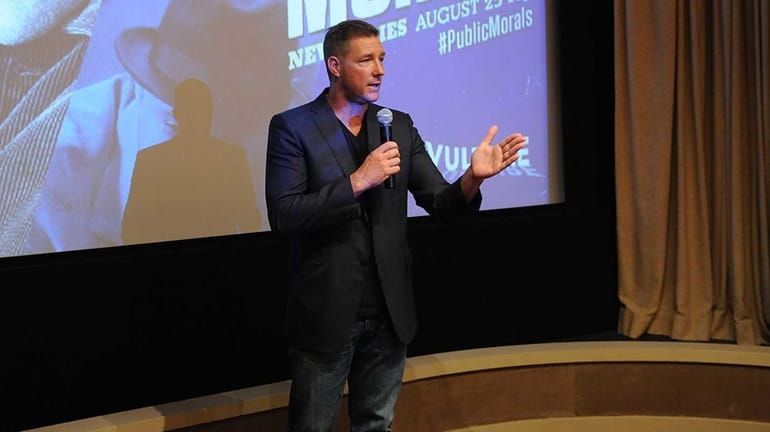Edward Burns draws on NYPD cop family memories for new TNT series, 'Public Morals'

Edward Burns attends The NYMag, Vulture + TNT Celebrate the Premiere of "Public Morals" in New York City on Wednesday, Aug. 12, 2015. Credit: Getty Images / Brad Barket
Valley Stream native Edward Burns hit it big 20 years ago with his first film, "The Brothers McMullen," which he wrote, directed and starred in. Now he moves his multihat-wearing to TV with "Public Morals," a police drama he wrote, directed and stars in, premiering Aug. 25 on TNT.
The series is about members of the vice squad in 1960s New York. Think "Law & Order SVU" 50 years ago, or "Mad Men" on the seedier side of town. It follows cop and family man Terry Muldoon (Burns), his wife (Elizabeth Masucci), his partner (Michael Rapoport) and Irish gangsters (Brian Dennehy, Neal McDonough).
Burns, 47, who has spent the past two decades writing and directing indie films and acting ("Saving Private Ryan"), now lives in Manhattan with his wife -- supermodel Christy Turlington -- and their two children. He spoke with Newsday contributor Joseph V. Amodio by phone from his car.
Can you hear me?
I can. I'm cruising on the L.I.E. to pick up my dad. I'm taking him to the city tonight for our premiere.
Nice. I gotta say, this series has a cool look -- the locations, the old Chevy Impalas you drive around . . .
Yeah. I was able to hire folks I've worked with a long time. Like my director of photography, Bill Rexer -- from Huntington, I might add -- he shot my last seven or eight films. So when we sat down to talk about the look of the show, we were all on the same page. We made a list of films inspiring us, and it was everything from "Mean Streets" to "The French Connection," some "Midnight Cowboy."
Part of the fun is trying to identify places in the city where you shot.
It wasn't too hard finding bars and restaurants that haven't changed much since the '60s. We shot at the Plaza Hotel, Russian Tea Room, Old Town tavern, Corner Bistro. Outside was tougher -- my location scout and I basically walked the city, block by block, searching for buildings that looked like they hadn't been power-washed, that still had old wooden doors, rusted wrought-iron gates. You'd be surprised, there's a lot left. That said, we did have to digitally erase air conditioners, signage, a glass building in the distance.
Your dad and uncle were NYPD cops.
Yeah, and I wanted to pull from my memories as a kid, growing up in a cop family and culture. In the pilot, that scene about my son being the school fool, and dad having to deal with the nuns -- that's completely autobiographical. That's me and my dad, word for word, down to that talk in the bedroom where the father says, "There's a fork in the road, and you need to make a decision."
Do you include tales of your dad's life on the force?
Not really. My dad gave me dialogue changes -- told me how things were done. Like when they pull up to arrest a guy, do they have a flashing light on the car or a siren going?
And . . .?
No lights, no radios.
We still hear about Italian mobsters, but what happened to the Irish, who dominated Hell's Kitchen?
Apparently they were smaller, and never as well organized as the Italian mob. The bulk of their business came from the West Side docks. When the piers closed, it ended. It's interesting you bring that up -- in the '60s there were still working-class ethnic neighborhoods. In season one we play a lot with the Irish in Hell's Kitchen, the Italians in Greenwich Village, and how Yorkville used to be called Germantown. If we're lucky enough to have season two, we'll go to the Lower East Side, controlled by Jewish gangsters.
I've got a story for you. Years ago, I went with friends to the restaurant Nobu. We leave, and my friends turn and say, "Did you see her?" I say, "Who?" "Christy Turlington." I say, "I'm within five feet of the most beautiful woman on the planet and you don't tell me?" I've never forgiven them.
Ah, yes . . . well . . . [He laughs.]
You're a lucky man.
Don't I know it.
Your memoir, "Independent Ed," came out this year. I hear she pushed you to write it.
Some film professors suggested I write a book -- said it would be helpful for students. I told Christy and she's, like, "Yeah, I've been telling you that for 10 years." She stayed on me till I finally got started. The writing was different from screenwriting. It felt like a homework assignment. But I'm glad she gave me a kick in the behind to do it. Film students seem to appreciate my candor -- I point out all the times I failed.
Gotta fail a bunch if you're gonna knock one outta the park.
Exactly . . . exactly . . .

